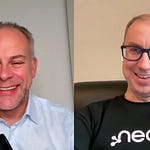In this episode of the EUVC podcast, Andreas and our in-house CVC expert, Jeppe Høier, are joined by Samuli Siren, CEO of Redstone, one of Europe's most successful venture capital firms.
Together, we’ll dive deep into Redstone’s approach to corporate venture capital, exploring how they’ve built a portfolio with around €600M across ten different funds. Redstone specializes in Series A rounds and is headquartered in Berlin, focusing on DACH (Germany, Austria, Switzerland) and global markets—particularly the U.S.
Redstone's focus spans multiple sectors, though always with a digital and B2B edge. Some of their standout investments include PlanRadar, Liqid, Psy, Finanzguru, Atlas Metrics, and Yoto. With Samuli, Redstone has excelled in attracting corporate investors, making his insights invaluable to anyone looking to understand how to raise capital from corporates.
Watch it here or add it to your episodes on Apple or Spotify 🎧 chapters for easy navigation available on the Spotify/Apple episode.
✍️ Guest’s show notes
We believe in giving you our guests' thinking directly and unaltered. Therefore, no changes, no AI, no nothing has been done to the following sections.
Principles and learnings for building Redstone VC
Own Values of being an Entrepreneur. Great company is when the employees can make the most out themselves, this will be a win & value add for the clients -> leads to revenue and value creation
CEOs job is to create an environment, where the employees can perform. I’m serving them, not the vice-versa,
Corporates are looking to learn and gain access. They operate in Quartals and VC (CVC) is always the nice-to-have project. Challenge is, how to make impact in a corporation?
What learnings would you say have been pivotal for you on this journey?
How to gain a long term commitment from corporates? Instead VCasaS, classic GP-LP mode.
People don’t pay much for data.
Create early impact
Deep Dive on your latest raise and how you work with CVCs
Takes always much longer than you think. Regulatory is pain and slows down everything enormously
Fastest commitment, 30m in 35 minutes
Slowest: 1m in 12 Months
Don’t they, you have to meet people 7 times to convince
How did the last raise for your fund differ from prior raises before the tech reset?
Example our Fintech 3 fund. 70% from old investors, closing planned end of the year, 1st closing minimum already reached,
Pre Reset, we were rather newbies in GP-LP so not a good comparison
What were the three things that allowed you to be so successful?
Endurance
Usage of my network
Amazing support from our shareholders and mentors
The team, partners, family - their commitment, attitude and believe in me
Core learnings from your last Corporate LP raise, and what makes you successful in raising from Corporate LP’s?
For sure our speciality are the banks. We have a good concept, but more so we understand in detail their regulatory and accounting challenges and can solve the issues raised.
Capital allocation plans are something to understand
A look at the person behind – Samuli Sirén.
Passionate entrepreneur – it’s like sailing, you’ve arrived while sailing, not in a harbour.
Positive thinking and endurance
Balance in life between family-myself-job - > creates satisfaction
AND, Redstone is not a job form, it is a way of living
Advice to young people in the CVC industry.
Learn how to sell, it is psychological game – you will need it always
Humor is a good instrument to use
Learn to listen (in detail and what behind, what somebody says)
Most counterintuitive learning.
Innovation and digital are not always very high prioritization, although they change the world
Internal ”crappy” teams win against external professionals
Founder of a corporate is the only entrepreneur there









